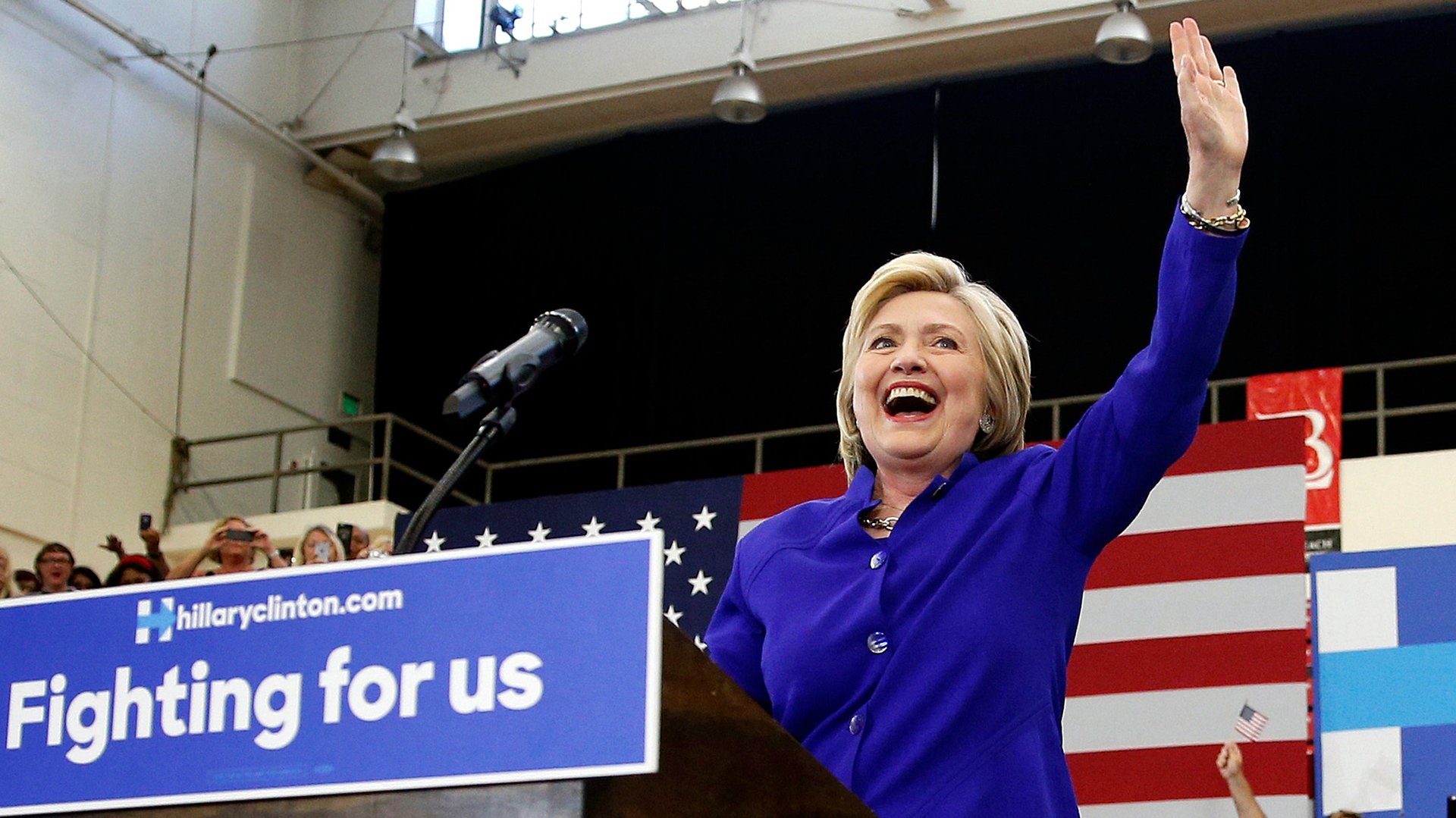Hillary Clinton is the first woman to become a major-party presidential nominee
For the first time in 240 years, voters have chosen a woman to lead a major US political party to victory in the presidential elections.


For the first time in 240 years, voters have chosen a woman to lead a major US political party to victory in the presidential elections.
Hillary Clinton, the former Secretary of State, senator, and first lady, won her opportunity to succeed Barack Obama, the first black president, largely because of her promise to tap into the same coalition of progressives, women, and minorities that put him in office.
Her victory—which has been nearly inevitable since she began racking up primary victories in March—was effectively clinched tonight after she won the New Jersey primary, and confirmed when she won by a large margin in California. She gained far more than the 215 delegates she needed to seize an absolute majority of the delegates allocated by Democratic voters, defeating her rival, Senator Bernie Sanders.
The Democratic nomination will be awarded at a July convention to whichever candidate wins a majority of 4,765 delegates to the convention. Most delegates are pledged by statewide elections or caucuses: Beginning the day, Clinton had 1,812 pledged delegates, corresponding to nearly 13 million votes, while Sanders had 1,521 delegates from almost 10 million votes.
There are also 719 “superdelegates,” elected officials and other party leaders who may vote for whomever they choose. Clinton arguably clinched the nomination yesterday (June 6), after voters in Puerto Rico pledged 36 delegates in their primary election, which, combined with her 571 superdelegate endorsements tallied by the Associated Press and other news organizations, show that she had the the majority to win in Philadelphia.
As Sanders’ campaign raged at the media’s rush to end a race that has grown stagnant, Clinton downplayed the calls, preferring to bolster her case as nominee by demonstrating conclusively that she is the voter’s choice—and she has, by a significant if single-digit margin.
Sanders’ backers have one last straw to grasp: Superdelegates do not vote until the convention and could change their minds to throw their support behind the Vermont senator. That calculus depends on the party establishment’s willingness to overturn the will of the voters in order to nominate one of their biggest critics—a highly unlikely possibility, though Sanders’ backers whisper darkly of a surprise scandals that might erupt before the convention to change their minds.
While Sanders’ presidential aspirations are effectively finished, his campaign says he will continue fighting until the convention in July. He retains his opportunity to play either spoiler or booster for Clinton’s goal of uniting the party and matching Obama in turning out young voters, who overwhelmingly favored the blunt-spoken socialist’s critique of the US economic system.
Clinton’s campaign focused relentlessly on the delegate battle even as Sanders’ popularity soared and pundits focused on her rhetorical shortcomings—discipline she learned from her failed run against Barack Obama during the 2008 primary.
It’s worth noting that Clinton defeated Sanders more soundly than she herself was beaten in 2008. At the time, Clinton barely edged out Obama in the popular vote and he only won the delegate battle by 300. Now, Clinton currently leads Sanders by more than 903 delegates and several million votes.
That difference suggests that Clinton will have less trouble unifying the party than pundits have claimed, especially when Obama endorses her and begins campaigning on her behalf. But Sanders’ decision of if, when, and how to endorse Clinton will play a major role in how the party’s newest voters feel about Clinton as she takes on Republican nominee Donald Trump.
If she defeats Trump in the fall, the US will belatedly join a club of major democracies, including the United Kingdom, Germany, Brazil, India, and Australia, who have already elevated female leaders to their highest political office.